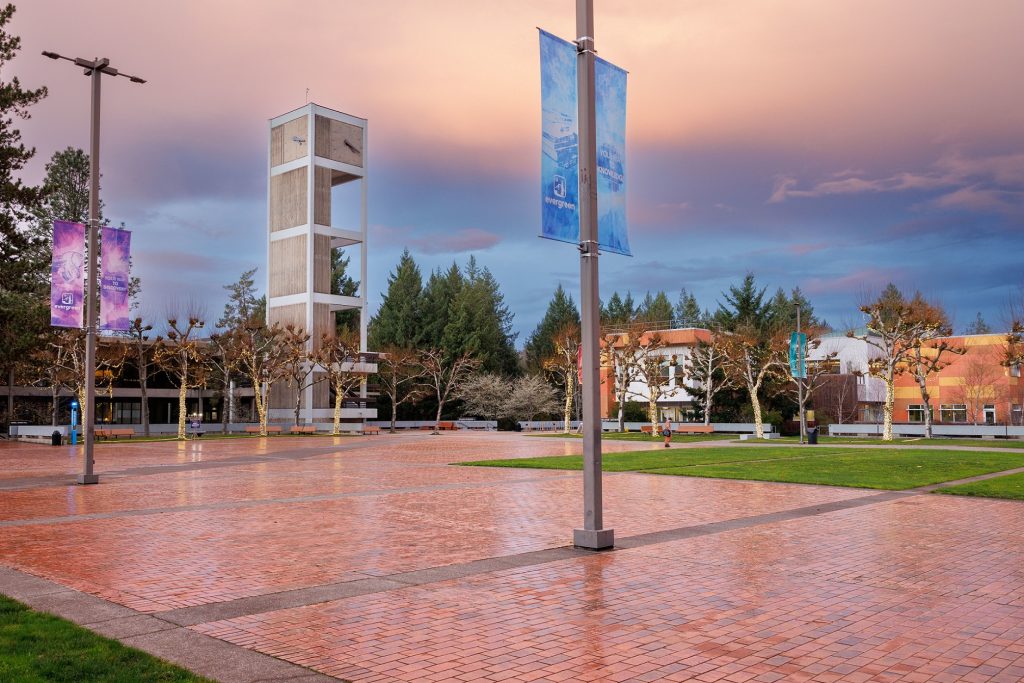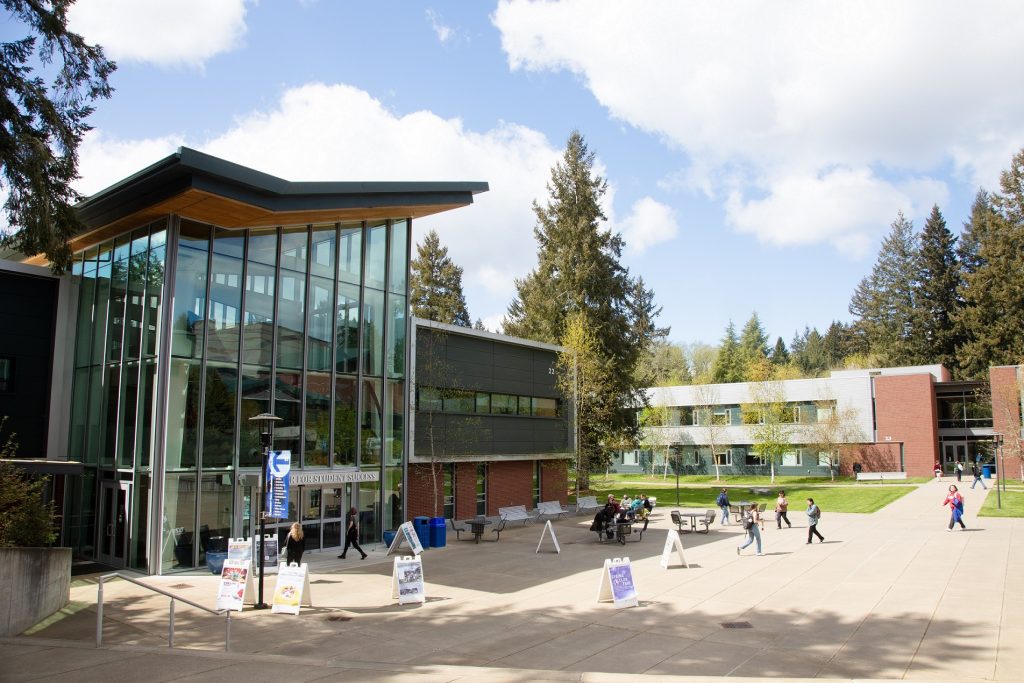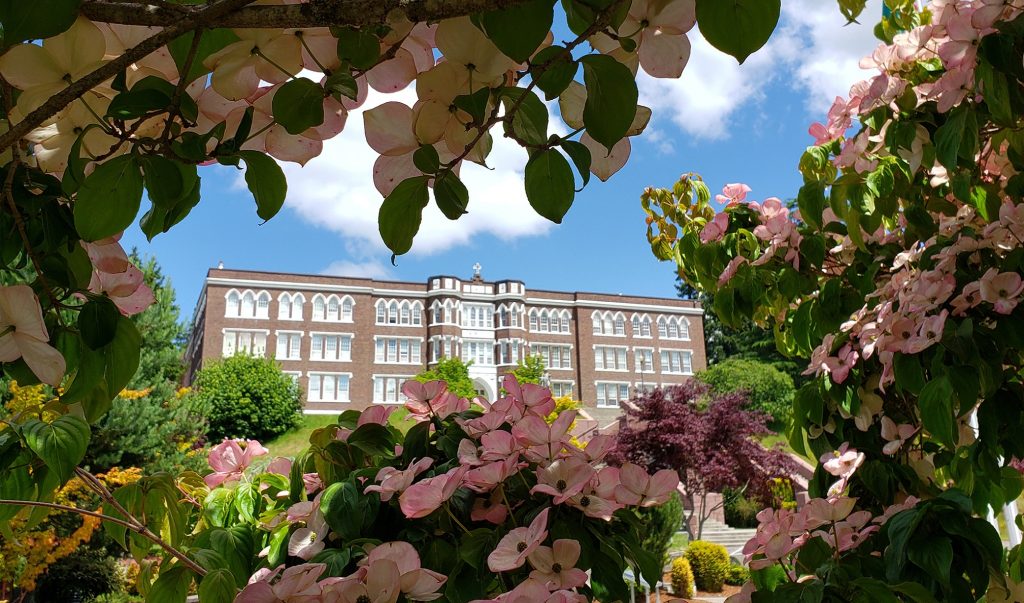When thinking about economic growth and development, we tend to focus on storefronts, restaurants and bustling destination spots that both draw in tourists and welcome new residents. But locally based, higher education has a tremendous impact on the surrounding community. For generations, the Thurston Economic Development Council (EDC) has emphasized that schools not only cultivate workforce talent and support entrepreneurial networks but also grasp the unique details of their region.
In Thurston County, we’re blessed to have The Evergreen State College, South Puget Sound Community College and Saint Martin’s University. School officials at all three are proud of the impact on their students and the area.

The Evergreen State College, since 1967
In a recent study by the Thurston EDC’s Center for Business & Innovation, researchers found that Evergreen’s total economic contribution to Thurston County was valued at $201,793,988, which includes $109,478,924 in income and 1,637.25 jobs. These impacts come from local operational and capital spending by Evergreen, spending by Evergreen’s student body and the spending of visitors who come from out of town to one of Evergreen’s many events hosted in Olympia.
Of The Evergreen State College students interviewed at the time, approximately 83% were employed and more than 16% were executives or board members of a nonprofit, both of which have an impact on many lives around them.
The Evergreen State College’s Public Relations and Marketing Director Kelly Von Holtz says they’re proud of this longstanding local legacy. “For more than 50 years, Evergreen graduates have gone on to careers in business and social entrepreneurship,” says Von Holtz. “Greeners can be found in leadership positions in many Thurston County businesses and civic organizations: Lisa David, co-owner of the Nineveh Assyrian Food Truck; Gabi Trautmann, owner of Gabi’s Olympic Cards and Comics; and Willow Whitton, founder of Holy Lamb Organics in Oakville are all Evergreen alumni.”

South Puget Sound Community College, since 1962
South Puget Sound Community College (SPSCC) and the Center for Business & Innovation did a similar study to Evergreen’s. Their formulas varied slightly because of SPSCC’s state funding as a community college. But it still showed that for a net cost of $13,881,079.83 to the state, SPSCC was able to leverage those funds against other revenue sources to create a total yearly output of $134.9 million. In addition, approximately 802.61 jobs were created or sustained due to SPSCC.
“In order to serve our local community, we must first work to truly understand their needs,” shares South Puget Sound Community College President Dr. Timothy Stokes. “Community colleges play this role uniquely well across the nation, but SPSCC does something special. Our staff and faculty are deeply embedded in nearly every industry found in Thurston County. That is intentional, because the relationships we build across sectors allow us to grow, adapt, change and prioritize our programs, degree offerings, partnerships and other work to meet the needs we know are present in the community.”
Stokes says that having a Top 10 United States community college in Olympia brings impacts beyond the financial for South Puget Sound Community College students. These include improving English language skills, gaining a high school diploma or professional technical credentials, being a steppingstone to higher education and giving local families a way to save money on schooling without sacrificing their future success.

Saint Martin’s University, since 1895
Saint Martin’s University ‘s Nathan Peters is the Interim Vice President for Institutional Advancement and Vice President for Marketing and Communications. “We prepare students to meet the demands of the local workforce through accessible, high-quality education,” he shares. “Our curriculum is tailored to address both current and future community needs, ensuring our graduates are well-equipped to contribute to local industries and sectors. Many of our students are from western Washington and remain here after graduation, helping build the local economy.”
Peters believes that local colleges serve as catalysts for positive change. “Local colleges and universities provide accessible education that empowers individuals with the knowledge and skills necessary to succeed in their personal and professional lives,” he says, “connecting qualified graduates with employers needing to hire.”
Saint Martin’s University is also a major employer both directly and by supporting businesses through procurement practices and collaboration. “Our students contribute to the local economy by participating in internships and job placements with nearby businesses,” says Peters, “bringing fresh perspectives and innovative ideas. This is shown in high-demand fields like nursing, where many of our students, who do their clinicals with local hospital systems such as Providence Swedish and MultiCare Health System, often receive job offers to stay in the area after graduation.”
Higher Education in Thurston County is a Win/Win/Win Thanks to The Evergreen State College, South Puget Sound Community College and Saint Martin’s University
Thurston EDC Executive Director Michael Cade appreciates these educational powerhouses. “A vibrant and inclusive community is built by three major significant factors: talent, tolerance and technology,” shares Cade. “These three Ts fuel the community. Many regions have a strength in one or two of these factors – and few if any have three of them. There are several factors that imbue a local economy with these elements, and typically these can be found deeply imbedded in that community’s educational system. The educational system supports the workforce system, supports and promotes critical thinking that creates innovation, which has a generational supportive impact. Thurston County is home to three higher education institutions that support the three Ts. Each provides resources, creates a talented workforce, creates awareness that builds tolerance, and imbues knowledge to build an innovative economy with technology.”
Find additional economic development research and resources through the Thurston Economic Development Council or attend an upcoming event to see how they can help your business grow and dream become a reality.
Sponsored

















































